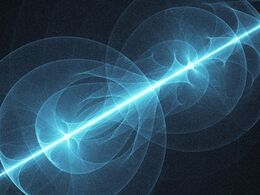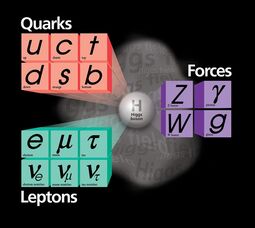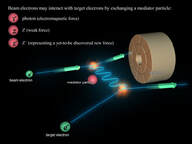 Let's get really scientific and see what the scientists say. Wave forms are what we're riding, all the time - only being made of particles right now, at the present moment, the You that was just reading that has now become an Advanced wave packet, and the You yet to get to the next sentence is waiting in the form of Retarded waves (those that travel forwards in time). In between the two, You right now are reading this with eyes made of particles that have collapsed the wave function, transmitting information into a brain that has also collapsed the wave function, simultaneously with all the other parts of you and of everything you see around you, which - you guessed it - has also been collapsing the wave function at exactly the same time. So in all this leaping about from one particular scenario to the next, let's look at the language - a particular event is, yes, an event in which our particles (and everyone else's) converged to engage in a 'particle moment' that our memory - wherever that is - can remember. But it's gone now. No going back to the past that isn't here and can never be again.....  Meanwhile, here you are reading me in particle reality, subjected to the four forces of nature - the strong, weak, gravitational and electromagnetic. Each of these forces has a corresponding particle that 'carries' it - the photon carries electromagnetism, the gluons that bond our quarkish material carry the strong force; the graviton hasn't been found yet (because its cuddly relationship with infinity causes a few problems), and as for the weak force, well... there are Bosons, W and Z bosons in particular, carrying weak force, which is only found to operate (experimentally) over the shortest of possible subatomic distances. But there's more to the weak force than meets the eye, for like the neutrino and the strangeness of quark-gluon plasma, the weak force carries certain conundrums. In allowing for oscillation, it breaks rules. In fact it violates them, like charge-parity for instance, and could well be involved in the phenomenon of entanglement, although at the time of writing there's no scientific evidence for this - investigation is, let's say, in the Restricted Zone. Let's say we've got to grips with some of this stuff in everyday life, knowing it's there. We know that gravity holds us steady on a planet revolving at a little more than 1,000mph in its spin at the Equator, while it revolves around the Sun at 67,000mph. (Just because we don't feel the G-force doesn't mean it isn't there.) We know too that the electromagnetic spectrum affords us a glimmer of opportunity to see what's going on thanks to visible light (which itself makes up just 0.0035 of the whole EM spectrum). The strong and weak forces hold our bodies (along with all other matter) together, but only the weak force allows for flexibility. The weak force enables transitions from one thing to another. And quoting Wikipedia, "The weak interaction is the only fundamental interaction that breaks parity-symmetry, and similarly, the only one to break charge parity symmetry."  So now we've got an idea of the strangeness of this force, what about an Alogy? Take a look at the article (from PhysicsWorld) behind this last picture and you will read that: "The experiment establishes for the first time that the weak charge on the electron varies with distance — a phenomenon called “running”. Also worth considering is the neutrino's interaction with the Weak Force and the problems it created ... : warwick.ac.uk/fac/sci/physics/staff/academic/boyd/warwick_week/neutrino_physics/weak.pdf Ok. We're running - fine. What we do know, deep down, is that all these components of Nature make us what we are, and we want to be better at being what we are than we have been for some time now, given that civilization is beginning to crack and we haven't even got our own houses in order. Critical is it not to take account of our mass and know what drives it, that we might make use of fuel in more interesting ways, to illuminate constraints and get us far enough from constants to experience some wonderment before that, too, vanishes under Fermi's Paradox. UPDATE 2020
Quantumology's Facebook Group is growing apace and actively producing some very interesting discussions. Please come along and join the fun!
0 Comments
Leave a Reply. |
AuthorKathy is the author of Quantumology. She met up with quantum mechanics in 1997, pledging allegiance to its sources thereafter. These are her personal thoughts and testimonies. Archives
April 2023
|
 RSS Feed
RSS Feed